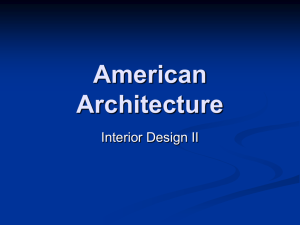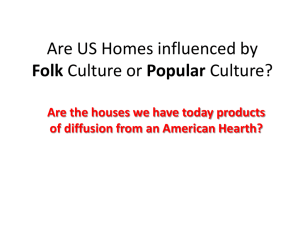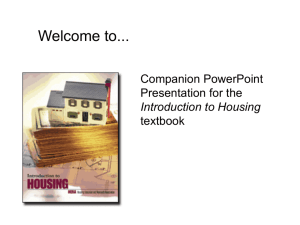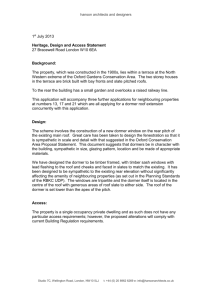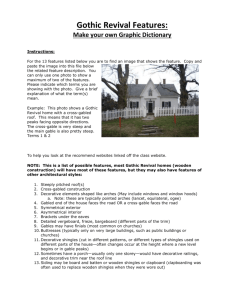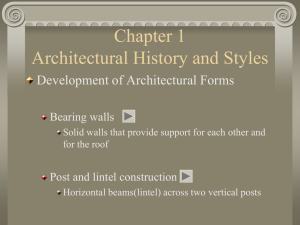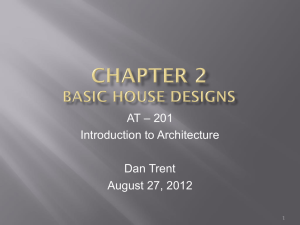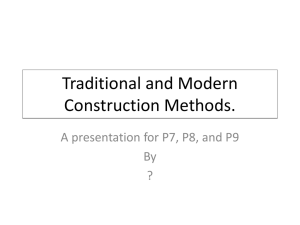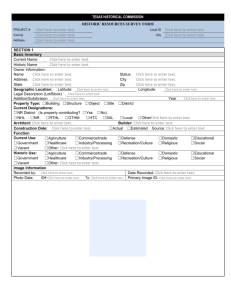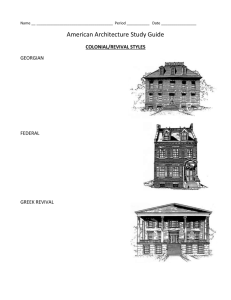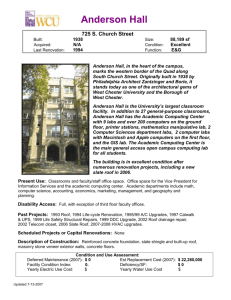American_Architecture
advertisement
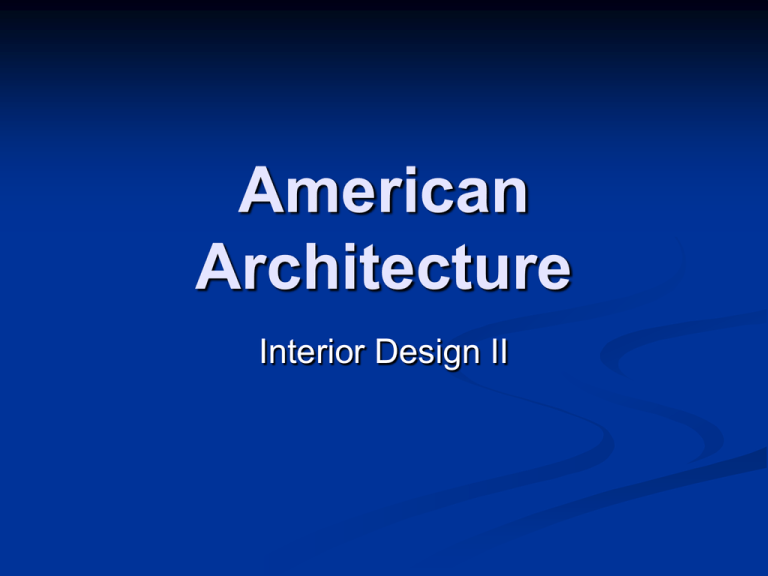
American Architecture Interior Design II Traditional American Georgian Federal Greek Revival Cape Cod Garrison Salt Box Dutch Colonial Jeffersonian Georgian Named the for the four King Georges 1720-1840 Imported from England (originals of these houses only exist in the 13 colonies) Symmetrical structure (proportion & balance 4x4) Hip or gable roof with dormer windows Widows walk Symmetrical windows with small panes of glass Dentil cornice & relieving arches Georgian Federal Popular just after Revolutionary War 1780-1830 Pediment Fanlight & column surrounding door 2-3 stories high Rectangular Lower windows taller than upper ones Federal Some other things to know: • Classical features reflect the new country embracing Greek style government. • Reflects anti-English and prodemocratic thought. • A rebellion against Georgian Style Greek Revival Reached height of popularity just before Civil War 1820-1850 Pedimented portico Sidelights with transom Symmetrical Associated with classical thought and democracy Greek Cape Cod Colonial Style Late 1690 to 1850 Gable roofs 1 level + loft/attic Central chimney & door Symmetrical 2 windows on each side of the door Clapboard siding Cape Cod “Rediscovered” 1920-1950 1½ stories Living space in attic Dormer windows Shutters Chimney relocated Wings to the side or on the rear Garrison Common in English medieval construction. Ornamental drops shaped like cannonballs under the jetty. They have a overhang Traditionally clapboard. Central chimney Revival 1920-1960 Garrison Salt Box Roof is similar to Colonial salt container Originated in the Colonial era around New England Popular from 1920-1970 Had a long rear roof Central chimney Usually 2-3 stories high Has shutters Dutch Colonial 1670-1760’s Broad Gambrel roof Flaring eaves End chimneys Double hung windows Dutch doors (double) Revival 1900-1930 Jeffersonian Thomas Jefferson 1790’s-1830’s Ocatagons Greek entrances Palladian windows Monticello Victorian Queen Anne Second Empire Gothic Queen Anne Popular in small towns and cities Popular from 1880-1900 Wrap around porches Often have towers Exterior is various materials and has lots of decorative trim (gingerbread) Second Empire Popular in the 19th century in France Came to be associated with Haunted Houses Mansard roof Windows hooded and may have corner quoins Gothic Irregular shape & floor plans Steeply pitched roof Elaborate vergeboard trim High dormers Gothic arch windows Familiar American Ranch Split-Level Farmhouse Bungalow (Craftsman) Prairie Style Contemporary Rustic Ranch Originated in California in the 1930s Most common of American house styles Reached its popularity during Eisenhower’s presidency Long, low bank of windows There is an attached garage carport Back patio Split Level Innovative spin off of the Ranch style Exterior similar to Ranch Style except for two-story wing Usually brick or brick and wood combination Interior space is split into three levels Lowest = utility and den, Middle = kitchen & living room, Upstairs = bedrooms Farmhouse A two-story home with one story front porch Gable roofs and dormer windows are common Suburban homes in the late 20th century Bungalow It started in California and spread across the country and became the most middle-class house design It started to 1910 to the 1930s They have a fairly deep porch and wide overhangs Prairie A product of the vision of Frank Lloyd Wright Popular from about 1900 through the 1920s. A hipped roof, French doors, Wide eaves and craftsman windows and coulmns The Waterfall House One of Frank Lloyd Wright’s most famous designs. Includes natural features of the property into the architecture. Fallingwater Contemporary Rustic Expression of the 1960’s nature movement Started in California and spread across America in 1960s -1970s Has wood siding typically with many different angles (diagonal) Windows are grouped into geometric compositions and come in various geometric shapes. Deck sprung from this style European Baroque Chateauesque Romanesque Mediterranean Tudor Baroque Architecture of the late Renaissance period Classic ornamentation Keystones or pediments over windows Balustrades on roof Balconies and patios Stucco and corner quions Hip roof flared at eaves Chateauesque Popular at turn of the century among wealthy Always masonry Formal arch entryway Window surrounds or keystones Steeply pitched roof – usually hipped Demi-dormer (windows break through roof line) Towers with conical roof Paired windows Semicircular arches Transom bar Romanesque (revival) Constructed of roughfaced, square stones Round towers with coneshaped roofs Columns and pilasters with spirals and leaf designs Low, broad "Roman" arches over arcades and doorways Patterned masonry arches over windows Spanish/Mediterranean Roots in California and Florida Popular 1920-1940 Barrel tile roof Stucco exterior Wrought iron work Arcade Tudor (revival) Roots in Old English style Revival began in 1970 Half timbering Also uses stone and/or brick Windows are small paned and usually diamond shape Resources http://architecture.about.com/cs/teacherstools/a/architecture101.htm http://architecture.about.com/library/bl-styles_index.htm http://www.architecturetoursla.com/gallery.htm http://www.bc.edu/bc_org/avp/cas/fnart/fa267/contents.html http://www.geocities.com/asiedydd/styles.htm http://www.greatbuildings.com/types.html http://www.infoplease.com/encyclopedia/1arch.html http://www.loggia.com/designarts/architecture/styles/styleguide.html http://www.preservationdirectory.com/architecturalstyles.html http://www.uwec.edu/geography/Ivogeler/w367/styles/
